- Home
- Lauren Willig
Masque of the Black Tulip pc-2 Page 5
Masque of the Black Tulip pc-2 Read online
Page 5
It was just so much less glamorous to think of the dreaded Black Tulip posing as a servant. Black Tulips weren't supposed to do things like bleach linen. They lurked in the corners of darkened hallways, swirling brandy snifters and twirling their mustaches. Or something like that.
Eeek! I staggered backwards as something moved in front of me, a misty form, shrouded in… oh. It was my own reflection in a darkened window. Ooops. A natural mistake, I assured myself.
If I didn't curb my imagination, I was going to be as ridiculous as that dim-witted heroine in Northanger Abbey, the one who pounced on a laundry list thinking it was going to be an account of ghostly goings-on. Colin would find me the following morning, hunched on the library floor in a gibbering ball of terror, moaning about clanking chains and eyes that burned out of the darkness where no eyes ought to be. Whatever had I been thinking to read all those ghost stories in my youth?
Taking my nerves firmly in hand, I continued onwards to the library with a firm gait and a defiant gaze. All the same, despite my resolution to not think about ghosties and ghoulies and things that go bump in the night, I couldn't help but wonder…
What had Colin meant by that comment about apparitions by my bed ?
Chapter Five
Almack's Assembly Rooms: a cunning ambush laid for unwitting English agents by a determined band of French operatives
— from the Personal Codebook of the Pink Carnation
At precisely five minutes to eleven, Miles sauntered through the hallowed portals of Almack's Assembly Rooms.
Ordinarily, Almack's was not high on the list of Miles's favorite places to pass an evening. Given a choice between Almack's and a French dungeon, Miles would usually choose the dungeon. As Miles had complained to his valet earlier that evening, the company in the dungeon would be more congenial, the entertainment more entertaining, and, devil take it, the food was probably better, too.
"I'm sure it is, sir," said Downey, who was busily trying to tie Miles's cravat into something resembling a current fashion. "And if sir would refrain from speaking for just a moment…"
"The deuce of it is," Miles expostulated, chin crushing the fold Downey had just ever so carefully arranged, "I gave my word. What's a man to do?"
"If sir does not permit me to tie his cravat," pointed out Downey acerbically, yanking away the ruined cravat with enough force to make Miles's eyes water, "sir will be sufficiently tardy that he will not be allowed into the assembly rooms."
Miles considered his valet thoughtfully. Hmm. The portals of Almack's closed at precisely eleven o'clock, by order of the Patronesses, and woe betide the unfortunate man who rushed up to the doors a moment too late. Wouldn't that be a shame if he wasn't able to get inside and was instead forced by cruel necessity to go to his club and drink a few bottles of excellent claret?
Miles shook his head, ruining a third square of starched linen in the process. "It's an excellent idea, Downey," he said, "But it just won't wash. I promised."
There was the rub. He had promised Richard, and a promise was a promise. A promise to one's best friend was a vow on the order of a blood-signed pact with Mephistopheles. You just didn't violate that sort of thing.
"You will keep an eye on Hen for me while I'm away, won't you?" Richard had asked as he clasped his best friend's hand in farewell, preparatory to leaving for Sussex and married bliss. "Scare away the young bucks, and all that?"
"Never fear!" Miles had promised blithely, giving his friend a reassuring whack on the back. "I'll keep her closer than a cloister."
The reference to nunneries had struck precisely the right note; Richard had gone away reassured.
After all, how hard could keeping an eye on one twenty-year-old girl at the odd evening event be? Hen was a sensible sort of girl, not one to dash out on balconies with fortune hunters or moon over the first rake to look her way. All Miles had to do was bring her a glass of lemonade every so often, bend a leg in the occasional country dance, and loom threateningly over any importunate fop who got too close: Hell, he enjoyed the looming bit, and the dancing wasn't all that onerous, either. Hen hadn't trodden on his toes — on the dance floor, at any rate — since she was fifteen. How much trouble could it be?
Ha. Miles would have laughed bitterly at his own naivete if it wouldn't have attracted too much attention. And attention was the last thing he wanted to attract. Miles resisted the urge to linger cravenly in the doorway.
There were all those… mothers out there. Mothers of the very deadliest kind. Matchmaking mothers. All of them determined to snare a viscount for their offspring.
It was enough to send a man running to Delaroche, begging to be put in a nice, safe cell.
Now, if he could just find Hen before someone spotted him…
"Mr. Dorrington!"
Damn, too late.
The sound came from a portly woman sporting a headdress with enough feathers to clothe a reasonably plump ostrich. "Mr. Dorrington!"
Miles feigned deafness.
"Mr. Dorrington!" the woman tugged at his sleeve.
"Mr. Who?" inquired Miles blandly. "Oh, Dorrington! I believe I saw him go into the card room. It's over that way," he added helpfully.
The woman's eyes narrowed for a moment, and then she laughed, whacking Miles so hard on the arm with her fan that Miles could have sworn he heard something crack. Probably his arm.
"La! You are droll, Mr. Dorrington! You don't remember me — "
If he had ever encountered her before, Miles had no doubt he would have remembered it. He would have had the bruises to remind him.
" — but I was a dear friend of your dear mama."
"How nice for you." Miles dodged another swipe of the fan.
"So of course the minute I saw you" — the fan swooped again, homing with unerring accuracy straight at Miles's nose — "I said to my darling daughter, Lucy — where did that girl go again? Oh, there you are — I said to her, Lucy" — Miles sneezed violently — "Lucy, we must simply go speak to dear, dear Annabelle's only boy."
"And now you have. Oh, look! There's an unmarried marquis looking for a bride!" Miles pointed in the opposite direction, and made a run for it.
Hen was going to owe him for this one. As soon as he found her.
Miles ducked behind a pillar, trying to simultaneously avoid that crazy woman with her bruising fan, and locate Henrietta. She wasn't on the dance floor; she wasn't at the refreshment table; and she wasn't in the card room. Miles couldn't see into the card room from his vantage point behind the pillar, but he didn't need to.
Above the chatter of voices, Miles heard a familiar laugh, and wheeled in the direction of the noise. There was something about that quality of frank amusement that couldn't belong to anyone but Henrietta.
Not an intrepid agent of the War Office for nothing, Miles successfully tracked the sound to its source. His eyes drifted past a bunch of Beau Brummell imitators who were staring people out of countenance through their quizzing glasses, past a lanky young lady who had clearly had an unfortunate accident with a curling iron, and finally settled on a familiar reddish-brown head adorned with a simple pearl clip. Henrietta and her two best friends, Penelope and Charlotte, were huddled in a corner, communicating in a combination of whispers, giggles, and agitated hand gestures. As Miles watched, Henrietta grinned and tossed a remark over her shoulder to Penelope, her hazel eyes alight with mischief.
An answering grin spread automatically across Miles's face, to be replaced by a frown as he noticed a young buck behind Henrietta also taking notice both of the infectious grin and the bare shoulder over which the remark had been addressed. Henrietta's shoulders and neck glistened in the candlelight, whiter than the pearls at her throat. Miles glowered, to little effect. The man raised his quizzing glass. Miles took a step out from behind his pillar, stretched to his full height, and cracked his knuckles. Then he glowered. Quizzing glass swinging from its riband, the man hastily hared off in the direction of the card room. Miles gave a satisfied nod.
He was getting quite good at this chaperonage lark.
And a good thing, too. The number of amorous importuners who needed to be glowered out of countenance had increased recently.
From behind his pillar, Miles regarded Henrietta, her features more familiar to him than his own. Over his lifetime he had spent a great deal more time looking at Henrietta than in his mirror. Superficially, not much had changed. Same long brown hair, limned in red-gold where the light touched it. Same hazel eyes, sometimes brown-green, sometimes blue, tilted at the edges as though in constant thought. Same translucently fair skin, quick to freckle in sunlight and prone to rash from nettles, wool, or any other itchy substance, a fact of which he and Richard had taken shameless advantage in their reprehensible youth. Henrietta's hair was as long and brown, her eyes as tip-tilted, her skin as pale as when she had been nine, or twelve, or sixteen. And yet, when one put them all together, the result now was quite different than it had been even a year ago.
Was she wearing her bodices cut lower? Her hair in a different way? She might not teach the torches to burn bright, but there was something glowing about her, something that made her stand out from Charlotte and Penelope. A new skin lotion, perhaps? Miles grimaced and gave up. Female fripperies eluded him. As for bodices, devil take it, she was his best friend's sister, committed to his care. He wasn't supposed to be aware she had a bodice. Of course, it would be bloody odd if she didn't have one, but the point remained. Anything under the neck was decidedly off limits. And his job was to make sure that every other man in the ballroom complied with that, too.
Looking up, Henrietta caught sight of Miles, and quite gratifyingly broke off whatever she had been in the process of saying to Penelope and Charlotte, face breaking into a broad smile of welcome.
Miles saluted.
Henrietta tilted her head and squinched her nose in an expression of interest and incredulity clearly meant to convey, "What on earth are you doing behind that pillar?"
There existed no facial contortions convoluted enough to explain that. Miles removed himself from behind the pillar, straightened his cravat, and strolled over towards Hen as debonairly as though he hadn't just been discovered standing behind a large piece of masonry.
"Who were you hiding from?" asked Hen, in some amusement, resting a gloved hand on his sleeve. She tilted her head back to look at him, both eyebrows raised at a droll angle. "Surely Monsieur Delaroche hasn't acquired a voucher to Almack's."
"Oh, no," Miles assured her. "Someone far, far more deadly."
Henrietta considered. "My mother?"
"Close," Miles said darkly. With appropriate hand gestures, he narrated his brief encounter with the fan-wielding, matchmaking mother from hell.
Henrietta's eyes widened with recognition. "Oh, I know her! She was after Richard all last Season. He actually knocked over a punch bowl just to create a diversion. He tried to make it look like an accident, but" — Henrietta shook her head with world-weary wisdom — "we knew."
"Someone" — Miles jabbed a finger at Henrietta — "might have warned me."
Henrietta fluttered her eyelashes in exaggerated innocence. "But that would have been unsporting."
"To whom?"
"To Mrs. Ponsonby, of course."
"You" — Miles narrowed his brown eyes at Henrietta — "are going to owe me for the rest of your life."
"You already said that last night. And the night before."
"Some things can't be said often enough," said Miles firmly.
Henrietta pondered that for a moment. "Like albatross."
"Albatross?" A lock of sandy hair flopped into Miles's eyes as he looked down quizzically at Henrietta.
"I just enjoy saying it," replied Henrietta cheerfully. "Try it. Albatross. It's even more fun when you draw out the first syllable a bit..Albatross!"
"And Richard was so sure insanity didn't run in the family," Miles mused loudly.
"Shhh! Or you'll scare away my marital prospects."
"You don't think you already did that by shouting albatross?"
"I wouldn't call that a shout, precisely. More of a gleeful exclamation."
Miles did what any good rake would do when losing an argument. He favored her with a slow, seductive smile, the sort of smile that made maiden hearts flutter and worldly widows take to writing scented notes.
"Has anyone ever told you that you have a wicked way with words, Lady Henrietta?"
Product of two older brothers, Henrietta was proof against seductive smiles. "You, usually. Generally when I've out-argued you over something."
Miles rubbed his chin in an expression of lofty thought. "I don't recall any such occasion."
"Oh, look!" Henrietta leaned confidentially towards him, the embroidered hem of her dress lapping at the toes of his boots, "I do believe you've been saved. Mrs. Ponsonby has latched on to Reggie Fitzhugh."
Miles followed the path of Henrietta's fan and noted with some re-lief that the crazy woman had indeed honed in on Turnip Fitzhugh. Turnip wasn't in the direct line for a title, but his uncle was an earl, and he did have an income of ten thousand pounds a year, enough to make Turnip a very attractive marital prospect for anyone who didn't mind a complete absence of mental capacity. That, from what Miles had viewed of this year's crop of debutantes, didn't look to be a problem. Besides, Turnip was a good chap. Not the sort of man Miles would want to see marrying his sister (there was little danger of that, as Miles's three half sisters were all considerably older, and long since leg-shackled), but he had a good hand with his horses, a generous way with his port, and a winning habit of actually paying his gambling debts.
He also had a positive talent for sartorial disaster. He was, Miles noted with mingled amusement and disbelief, dressed entirely a la Carnation, with a huge pink flower in his buttonhole, wreaths of carnations embroidered on his silk stockings, and even — Miles winced — dozens of little carnations twining on vines along the sides of his knee breeches. Turnip's recent sojourn on the Continent had clearly done nothing to improve his taste.
Miles groaned. "Someone needs to kidnap his tailor."
"I think it adds a touch of color to the evening, don't you? Our flowery friend will be so flattered."
Miles lowered his voice and made a show of toying with one of the ruffles of his cravat. "Be careful, Hen."
Henrietta's hazel eyes met his brown ones. "I know."
Since he was there in loco fratensis, Miles was about to say something wise and big-brotherly, when he was distracted by a familiar pounding noise.
It wasn't the headache — being a big, strong man, Miles never succumbed to such minor ills as the headache — and it wasn't French artillery, and as far as he knew, there weren't any giant-bearing beanstalks in the vicinity, so it could only be one thing.
The Dowager Duchess of Dovedale.
"I'll just get you that lemonade now, shall I?"
"Coward," said Henrietta.
"Why should two of us suffer?" Miles started to edge backwards as the duchess thumped forward.
"Because" — Henrietta caught hold of his sleeve and tugged — "misery loves company."
Miles looked pointedly at the Dowager Duchess, or, to be more precise, at the bundle of fur draped over the dowager's arms like a particularly mangy muff, and yanked his arm out of Henrietta's grasp. "Not this company."
"That hurts." Henrietta clasped a hand to her heart. "In here."
"You can pour lemonade on the wound," replied Miles unsympathet-ically. "Oh, hell, here she comes. And her little dog, too. Damnation!"
Miles fled.
"Hmph," said the dowager, stumping up to the three girls. "Was that Dorrington I saw fleeing?"
"I sent him to fetch me some lemonade," explained Henrietta on Miles's behalf.
"Don't try to fool me, missy. I know flight when I see it." The Dowager Duchess watched Miles's rapidly retreating back with some complacency. "At my age in life, making young men run away is one of the few pleasures left to me. Had young Ponsonby jum
p out a second-story window the other day," she added with a cackle.
"He twisted an ankle," Charlotte informed Henrietta softly. Having her grandmother in the vicinity had a considerably dampening effect on both Charlotte's spirits and her voice.
"Of course, it wasn't always that way," the Dowager Duchess continued, as though Charlotte hadn't spoken. She chortled in gleeful reminiscence. "When I was your age, all the young bucks were mad for me. I had no fewer than seventeen duels fought over me in my youth! Seventeen! Not one of them mortal," she added, in a tone of deep regret.
"Aren't you glad to know you weren't the cause of a good man's death?" teased Henrietta.
"Hmph! Any boy fool enough to fight a duel deserves to die in it! We need more duels." The Dowager Duchess raised her voice. "Reduce the number of half-wits clogging the ballrooms."
"What?" Turnip Fitzhugh ambled over. " 'Fraid I didn't catch that."
"My point exactly," snapped the Dowager Duchess. "Speaking of half-wits, where's young Dorrington got to? I like that boy. He's a pleasure to torment, not like some of these young milksops." She glowered at poor Turnip, the nearest available milksop. "What's Dorrington doing, squeezing the lemons?"
"Probably hiding behind a pillar somewhere," suggested Penelope. "He's good at that."
Henrietta shot her best friend an exasperated look.
Charlotte came to the rescue. "There's usually a crush around the refreshment table."
The Dowager Duchess eyed her granddaughter without favor. "All this namby-pamby good nature came straight from your mother's side. Always told Edward he was weakening the bloodline."
Henrietta unobtrusively reached out a gloved hand and squeezed Charlotte's arm. Charlotte's gray eyes met hers in a look of quiet gratitude.
"Aha!" The dowager let out a crow of triumph. "There's Dorrington! Never made it as far as the lemons. But who's that hussy he's talking to?"
Chapter Six
Orgeat: 1) an almond-flavored syrup commonly served at evening assemblies; 2) a deadly and swift-acting poison. Note: The two are almost entirely indistinguishable.

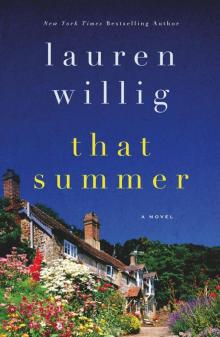 That Summer
That Summer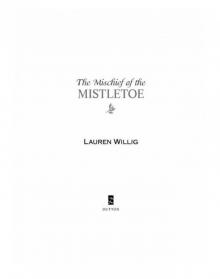 The Mischief of the Mistletoe
The Mischief of the Mistletoe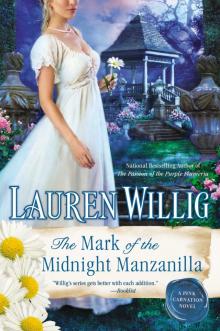 The Mark of the Midnight Manzanilla
The Mark of the Midnight Manzanilla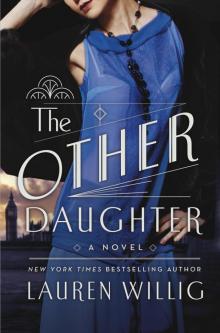 The Other Daughter
The Other Daughter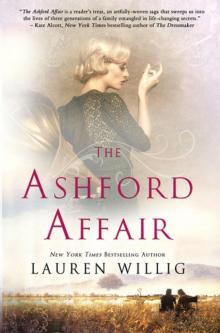 The Ashford Affair
The Ashford Affair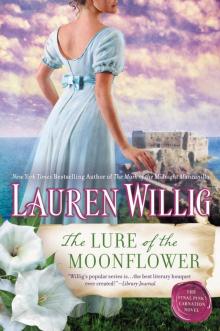 The Lure of the Moonflower
The Lure of the Moonflower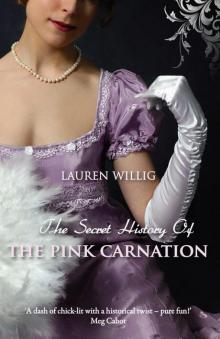 The Secret History of the Pink Carnation
The Secret History of the Pink Carnation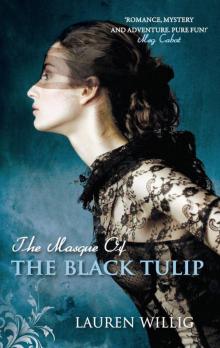 The Masque of the Black Tulip
The Masque of the Black Tulip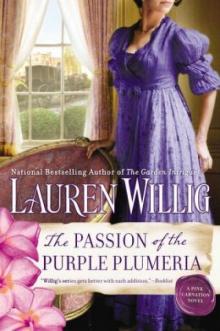 The Passion of the Purple Plumeria
The Passion of the Purple Plumeria The English Wife
The English Wife The Garden Intrigue
The Garden Intrigue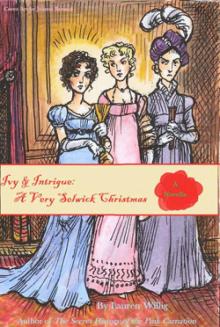 Ivy and Intrigue: A Very Selwick Christmas
Ivy and Intrigue: A Very Selwick Christmas The Orchid Affair
The Orchid Affair The Summer Country
The Summer Country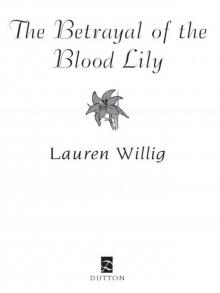 The Betrayal of the Blood Lily
The Betrayal of the Blood Lily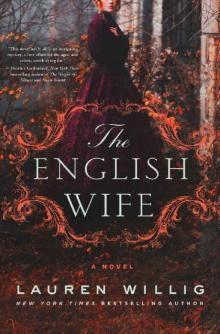 The English Wife: A Novel
The English Wife: A Novel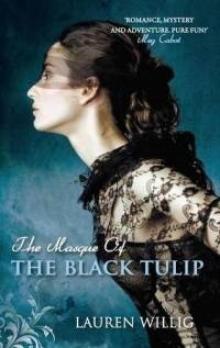 Masque of the Black Tulip pc-2
Masque of the Black Tulip pc-2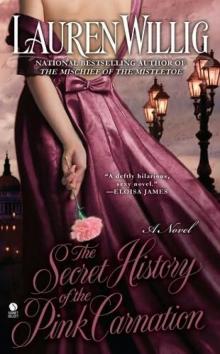 The Secret History of the Pink Carnation pc-1
The Secret History of the Pink Carnation pc-1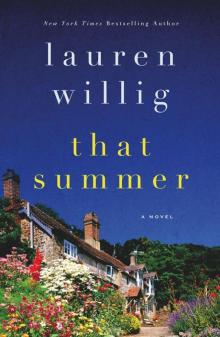 That Summer: A Novel
That Summer: A Novel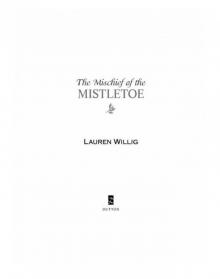 The Mischief of the Mistletoe: A Pink Carnation Christmas
The Mischief of the Mistletoe: A Pink Carnation Christmas